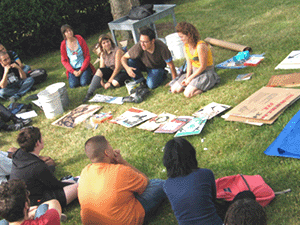
Five days before journalists converged in Detroit for the Allied Media Conference, another independent media publication fell. After thirteen years of producing cutting-edge content, Punk Planet announced that "the final issue is in the post."
Punk Planet was a bi-monthly, "fiercely independent" magazine reporting on music, culture and politics. The magazine’s announcement follows a growing list of other independent media publications that have closed up shop, prompting Punk Planet to blog, "And you will know independent publishing by the trail of dead." The slain include the radical social justice magazine Clamor, the witty art and culture magazine Kitchen Sink, the irreverent LiP magazine, and the vegetarian-focused Satya, among, sadly, others.
And with so many additional independent outlets dipping their toes in financial mires, nervous journalists traveling to Detroit last weekend were looking to each other for answers.
The Allied Media Conference (AMC), now in its ninth year, brings together journalists and social justice activists to strategize on the role of independent media to create social change. This year’s theme, "Breaking Silence, Building Movements," focused on participatory media that "empowers the producer and receiver" by inviting traditionally marginalized groups in the media to become media makers themselves.
The AMC, first started by Clamor magazine founders Jen Angel and Jason Kucsma, was organized this year by a team of activists in Detroit. Workshops, of which there were over 60, included hands-on trainings, group discussions, and informative panels.
Attendees could sit in on a session about fighting for local radio, join a discussion about the responsibilities of "movement journalists," learn technical skills in a vlogging workshop, and get keyed in to the popular education and radical teaching movement.
But for many journalists at the AMC, the question wasn’t how to build movements, but simply, "How do we survive?"
 In one of the smallest rooms in the conference hall, held at Wayne State University, about two dozen journalists met during lunch for a print media caucus aptly titled, "Evolve or Perish?" Journalists representing an array of publications, including Bitch, Fault Lines, Critical Moment, Utne Reader, Left Turn and the Fifth Estate, shared ideas on two central themes: money – how to get it, and how to keep it – and distribution.
In one of the smallest rooms in the conference hall, held at Wayne State University, about two dozen journalists met during lunch for a print media caucus aptly titled, "Evolve or Perish?" Journalists representing an array of publications, including Bitch, Fault Lines, Critical Moment, Utne Reader, Left Turn and the Fifth Estate, shared ideas on two central themes: money – how to get it, and how to keep it – and distribution.
But with less than two hours to caucus, the group ended the session with just the beginnings of a brainstorm, and the promise to continue the discussion online.
The murmurings about the future of independent media, however, did not die down.
"Clamor was always teetering," said Jen Angel, co-founder of Clamor. "The NewStandard was always teetering. But Punk Planet, a lot of people felt like it was more stable. And now that it’s fallen, people are like, ‘Oh my god, this is like a big canary in the mine shaft. Something horrible is happening.’"
Adding to print media’s struggle has been the demise of the Independent Press Association (IPA) in January, which handled newsstand distribution and advocacy services for more than 500 members. As the IPA toppled, due mostly to financial mismanagement, it left many independent publications without a future distributor, and with boxes of current issues that couldn’t get to newsstands. What’s more, the IPA went slinking away owing thousands of dollars to its magazine clients. "[The IPA was not] on top of Clamor’s distribution, so when we re-launched our issue, we got dropped by Borders," Angel said. "So our re-launch was not in Borders. You can’t quantify the effect of that. Ok, well you lost the sales at Borders, but it also meant ‘X’ thousands of people didn’t see it and weren’t exposed to us, so that meant how many subscriptions did we lose?"
Other publications experienced similar pain. LiP magazine is now offering their last issue for free online "because our distributor folded the last issue of LiP was distributed to only a handful of outlets."
David Schimke, the editor of Utne, said that without organizations like the IPA "there’s no one to fight for independent press." Recently, Utne was taken off the shelves at Wild Oats grocery stores after a big grocery chain bought the stores and changed newsstand strategies.
"Somebody should have been fighting that," Schimke said. "Somebody should have been in the room, but there’s nobody to fight that fight."
Schimke also said the effects of the increase in postal rates will be "huge" for independent publications. "Any time the rate goes up at all anyway, it really hurts, so I can’t imagine," he said. In March, the United States Postal Service accepted a modified version of a rate structure proposal written by Time Warner. Tellingly, the new rates benefit large media conglomerates able to ship in bulk, but could be crippling for smaller publications.
Angel predicted that the increases "may force more people online." Indeed, already some print publications have put aside their hard-copy editions for online versions. The veg-friendly Herbivore magazine recently overhauled their operations, transitioning to become an online magazine with two yearly print supplements.
"We have the mindset already that if we’re going to be around in the future, we’re going to have to go online eventually," Schimke said. "So we’re trying to make that move, but it’s really tough."
Puck Lo, a freelance journalist based in Oakland, California, said she thinks independent media is "undergoing a transformation right now" that will include more print publications turning to the Internet. But even transitioning to the Internet may not be the panacea, as online publications are facing their own struggles. In April, the independent, reader-funded, hard-news publication The NewStandard shut down after three years because the project became unsustainable.
Lo said that as print publications move online, she thinks "we’re losing something very important." But, she says, "I’ve seen a lot of small newspapers pop up, like community newspapers. And that gives me a lot of hope that strangely, in this massive monopolization process, very small scale efforts are filling in the gaps."
Schimke, however, is not as relieved by the burst of smaller-scale publications.
"The whole point of the independent press is to report stories the mainstream media is ignoring or scared to get into," he said. "That’s the scariest to me, frankly, about all of this: even if you can make it as an independent outlet, the amount of resources you need to do meaningful and impactful work is just not there."
Although journalists weren’t quick to blame readers for print media’s woes, often the financial support from readers does not materialize.
"I think [readers] don’t really understand their role," Angel said. "With the radio model, people understand that if they don’t support it, it’s not going to be there. But with magazines, especially because they’ve already given a subscription, they think, ‘Why do I need to give more money?’"
Comparing donations to the concept of tithing, Angel added, "If every person who supported independent media gave five percent of their income, it would be huge."
Signs of Resistance
Although the situation for print media appears bleak, there were also signs of hope, progress and resistance for independent media at the AMC. A session titled "Indymedia is Not Dead" chronicled the success of several Independent Media Centers just as many others have folded as open source publishing has given rise to more popular, albeit corporate, websites like YouTube.
People of color and youth were two major contingents at the AMC, and were breathing new and innovative life into independent media. Activist and presenter Grace Lee Boggs said in a panel that "there’s a shift taking place here" regarding youth becoming media makers.
"We’re just trying to prove a point that young people can do what adults can do," said Phuong Ninh, a sixteen-year-old member of the Philadelphia Student Union.
"I want to see the people who have historically been excluded in media making the media," said Lo. At the AMC, youth from Detroit Summer’s Live Arts Media Project facilitated a discussion about the CD they produced over the last year that documents students’ experiences in inner-city schools.
Schimke said that the AMC was inspiring for the number of people it brought together who are invested in independent media. "Despite the fact that we’re in this transitional period, just the fact that people are engaged gives me some hope," he said.
In the basement of the conference hall, skilled journalists trained youth in a "hands-on media lab" that showed attendees how to "use documentary to organize against violence and colonization." The question kept coming up about what we need to do about media. Throughout the workshops, people answered with "recognize that it’s up to us."
But with only one workshop specifically asking "What do we need to do about the crisis facing print media?" journalists could only hand each other buckets to help bail out the sinking ship.
The location of the AMC – Detroit – was fitting for the way activists are taking back their city. Equally fitting, however, were the vacant buildings, hollow houses and silent streets of Detroit that loomed like a warning for the print journalists who converged there. All that was absent was a warning bell, which should have been ringing. "I think [print media is] going into a pretty dark period for awhile," Schimke said.
***
Megan Tady is a National Political Reporter for In These Times and a freelance journalist based in Western Massachusetts.
